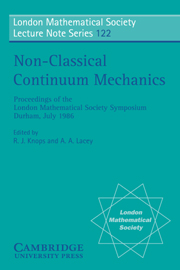 Non-Classical Continuum Mechanics
Non-Classical Continuum Mechanics Published online by Cambridge University Press: 11 May 2010
Introduction
The study of pulse propagation in one dimensional random media arises in many applied contexts. While reflection and transmission of monochromatic waves was studied extensively some time ago [1–6 and references therein], new and perhaps surprising results emerge in the study of pulses that cannot be understood simply from the single frequency analysis by Fourier synthesis. The numerical study of Richards and Menke [7] drew our attention to these questions and led to [8] and [9]. Here we extend and simplify the analysis of [8] and give several new results. The computations are at a formal level comparable to the one in [8].
In [8] we analyzed the reflection of a pulse that is broad compared to the size of the inhomogeneities of the random medium. The random functions characterizing the medium properties were statistically homogeneous. We gave a rather complete description of the reflected signal process in a well defined asymptotic limit in which it has a canonical structure. We introduced the notion of a windowed process and showed that the canonical reflection process is windowed and Gaussian. We found a scaling law for the power spectral density but not its explicit form. All this was subjected to extensive numerical simulations in [9] where an intrinsic scaling, localization length scaling, was introduced that makes comparison to the theory much more reliable. This intrinsic scaling idea is not fully understood theoretically but seems to be very promising.
In this paper we extend the analysis to random media that are not statistically homogeneous. The incident pulse is now broad compared to the size of the inhomogeneities but short compared to the scale of variation of the mean properties.
To save this book to your Kindle, first ensure [email protected] is added to your Approved Personal Document E-mail List under your Personal Document Settings on the Manage Your Content and Devices page of your Amazon account. Then enter the ‘name’ part of your Kindle email address below. Find out more about saving to your Kindle.
Note you can select to save to either the @free.kindle.com or @kindle.com variations. ‘@free.kindle.com’ emails are free but can only be saved to your device when it is connected to wi-fi. ‘@kindle.com’ emails can be delivered even when you are not connected to wi-fi, but note that service fees apply.
Find out more about the Kindle Personal Document Service.
To save content items to your account, please confirm that you agree to abide by our usage policies. If this is the first time you use this feature, you will be asked to authorise Cambridge Core to connect with your account. Find out more about saving content to Dropbox.
To save content items to your account, please confirm that you agree to abide by our usage policies. If this is the first time you use this feature, you will be asked to authorise Cambridge Core to connect with your account. Find out more about saving content to Google Drive.